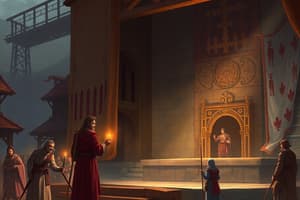Podcast
Questions and Answers
What are the dates for Medieval Theatre?
What are the dates for Medieval Theatre?
500 A.D.- 1500 A.D.
What type of performers were there in the Early Middle Ages?
What type of performers were there in the Early Middle Ages?
storytellers, jesters, tumblers, and jugglers.
Why did the Church ban theatre?
Why did the Church ban theatre?
the Church thought theater was barbaric and pagan.
Who are the playwrights from the Roman Period?
Who are the playwrights from the Roman Period?
What is an example of Roman Spectacle?
What is an example of Roman Spectacle?
Why did the Church revive Theatre?
Why did the Church revive Theatre?
What are the other ways the Church tried to teach parishioners?
What are the other ways the Church tried to teach parishioners?
What are the '3M's' of Medieval plays?
What are the '3M's' of Medieval plays?
What is a Passion play?
What is a Passion play?
What is a Troupe?
What is a Troupe?
What is a Cycle?
What is a Cycle?
What does Allegory mean?
What does Allegory mean?
What is a pageant wagon?
What is a pageant wagon?
What is a Mansion in Medieval Theatre?
What is a Mansion in Medieval Theatre?
What are guilds?
What are guilds?
What is Everyman an example of?
What is Everyman an example of?
Who is the main character in medieval morality plays?
Who is the main character in medieval morality plays?
What is the main theme in medieval morality plays?
What is the main theme in medieval morality plays?
Flashcards are hidden until you start studying
Study Notes
Medieval Theatre Overview
- Medieval Theatre existed from 500 A.D. to 1500 A.D.
- Performers in the Early Middle Ages included storytellers, jesters, tumblers, and jugglers.
Church and Theatre
- The Church initially banned theatre, considering it barbaric and pagan.
- Theatre was revived by the Church as a means to educate the illiterate population.
Methods of Education
- The Church utilized cathedrals, stained glass windows, sculptures, paintings, and drama to teach parishioners.
Types of Medieval Plays
- Three main types of plays known as the "3M's":
- Mystery plays: Based on Biblical stories.
- Miracle plays: Focused on the lives of saints.
- Morality plays: Serve as allegories reflecting moral lessons.
Specific Play Types
- Passion play: Centers on the last week of Christ's life.
- Troupe: Short dramatized scenes incorporated into the Catholic Mass.
- Cycle: A series of interconnected short plays depicting various religious historical events.
Key Concepts and Terms
- Allegory: A symbolic narrative that represents abstract ideas through characters.
- Pageant wagon: A mobile stage used to present plays at different locations, similar to a parade.
- Mansion in Medieval Theatre: A setup of stages arranged around a town square, with heaven and hell at either end, featuring elaborate special effects like floods and fiery pits.
Guilds and Competition
- Guilds: Groups of tradesmen responsible for depicting a portion of a Biblical story which, when combined, formed a cycle. Guilds competed to create the most elaborate productions.
Notable Figures and Themes
- Everyman: Represents every individual and is the main character in morality plays, imparting moral lessons to the audience.
Studying That Suits You
Use AI to generate personalized quizzes and flashcards to suit your learning preferences.



